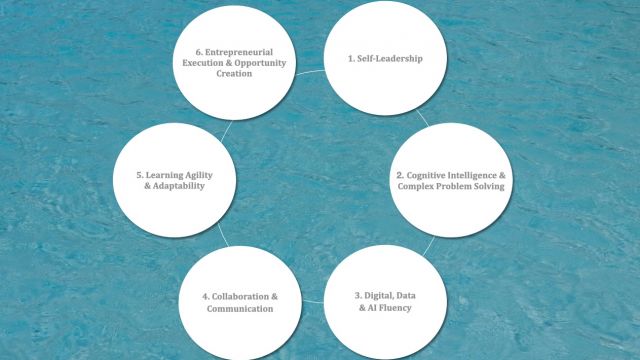
SL014 Recognizing Relevance
A Key Competence for Leaders
- How often do you feel that your day is dominated by urgencies that, in the end, have little real impact?
- How often do you plan to work on a central strategic task – and then find yourself lost in emails, coordination, or trivial matters instead?
- How often do you feel overwhelmed by the sheer flood of information and options – and the question remains: What is truly relevant here?
Welcome to a new episode of Self-Leadership with Dr. Bensmann, where we explore how mastering self-leadership helps you thrive across all areas of your life. My name is Burkhard Bensmann. As a consultant, executive coach, and professor, I focus on helping individuals navigate the complexities of leadership and personal growth.
⸻
1. Let us first figure out: What do we mean by relevance?
The word comes from the Latin relevare – “to lift up, to highlight.” Something is relevant if it should stand out compared to other things because it is important for a goal, a situation, or a decision. In a sea of information, our relevance filters determine where we direct our limited attention. Without them, we would be overwhelmed. And here is my key point: relevance is not an abstract idea. It is a practical, everyday capability. Leaders who fail to recognize relevance run the risk of remaining in a constant reaction mode – instead of shaping and directing.
⸻
2. Why is relevance even more important today?
The ability to determine what is relevant has always been crucial. But under current conditions, it has become dramatically more important:
• Information overload – we live in permanent overstimulation.
• Density of crises – pandemic, geopolitical tensions, climate change, technological disruptions. Everything seems to demand attention at once.
• Rising expectations – employees expect clarity, priorities, and orientation.
⸻
3. The psychological and physiological foundations
To understand relevance, it helps to take a look at the brain. From the perspective of Neurobiology: In the limbic system – especially in the amygdala – stimuli are evaluated for significance. Threats are prioritized immediately. Reward signals and social cues also receive preferential processing. Neurotransmitters such as dopamine act as amplifiers. And from the perspective of Psychology: Relevance is always subjective. It depends on:
• our goals,
• our values,
• our experiences.
To give you an example: Someone who values innovation will quickly notice opportunities and creative impulses. Someone focused on security will immediately detect risks.
⸻
4. Can we strengthen our ability to judge what is relevant?
Yes. While we are born with basic biological patterns, we can train our competence in recognizing relevance.
The 3×3 Framework for Training Relevance
1. Attention – Sharpening Perception
- Morning Attentional Warm-up – begin the day with two minutes of noticing sights, sounds, and sensations.
- Focused Presence – in meetings, give full attention to one colleague at a time (tone, gestures, signals). Attention sharpens when you deliberately practice presence.
- Conscious Breaks – Overload blinds us to the essential. Create spaces of pause to regain clarity.
2. Reflection – Guiding with Purpose
- Clarify Mission and Values – know what you stand for to recognize what truly counts.
- Quick Alignment Checks – during the week, ask: “Is this aligned with my mission and my role?” This keeps your inner compass active.
- Relevance Journal – each evening, note what was genuinely relevant today – and why.
3. Action – Designing for Focus
- Differentiate Importance vs. Urgency – Do your definition of „important“ and „urgent“. Apply methods like the Eisenhower Matrix or ask: “Does this move us forward or just keep us busy?”
- Cognitive Control Practices – work in 45-minute focus sprints, mute notifications, and set “do not disturb” times. Regain control over your tools, such as your Smartphone. Protect your focus and your deep work.
- Collective Scouting & Intuition – ask your team weekly: “Were we working on what really mattered?” Also notice body signals and gut feelings, then test them rationally.
By training attention, self-reflection, and cognitive control in concrete, small steps, leaders can build a solid foundation for better relevance decisions.
⸻
5. A call to action
Reflection impulse for you – In the coming days, ask yourself:
• What are the truly relevant issues for my organization in the next 12 months?
• How do I recognize that something is relevant – and not just urgent?
• Where am I currently being distracted by only apparent relevance?
⸻
6. Conclusion
Relevance is not a side issue. It is part of the core architecture of effective leadership. Leaders who fail to grasp what is truly relevant risk being consumed by noise, urgency, and endless activity. They might be busy, but they are not impactful. Those who sharpen their ability to recognize and convey relevance provide something invaluable: orientation. And orientation is what people look for in times of complexity and uncertainty. It helps teams focus, reduces stress, and builds trust.
⸻
7. Closing
This was today’s episode of Self-Leadership with Dr. Bensmann. If you found inspiration here, I would appreciate it if you share the podcast with others. And perhaps you want to jot down right away: What was truly relevant for you in this episode?
Inquire about a Transformative Session
And if you are looking for active support, contact me through my website or by email to bb@bensmann-consulting.com and inquire about a Deep Dive Session.
Music Into & Outro by Joakim Karud http://soundcloud.com/joakimkarud


